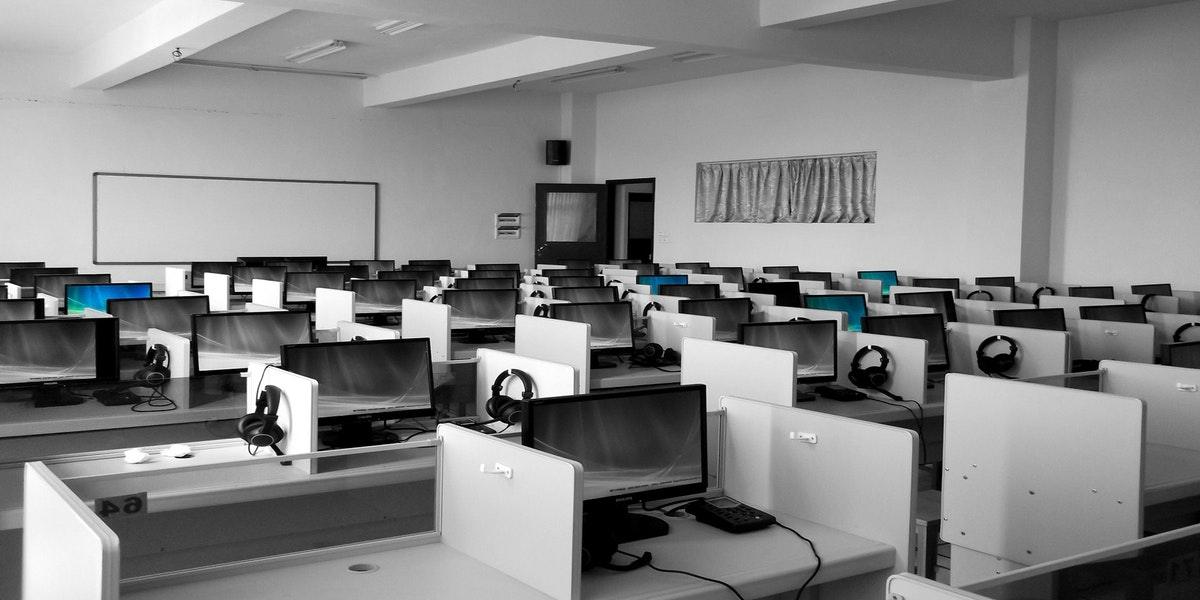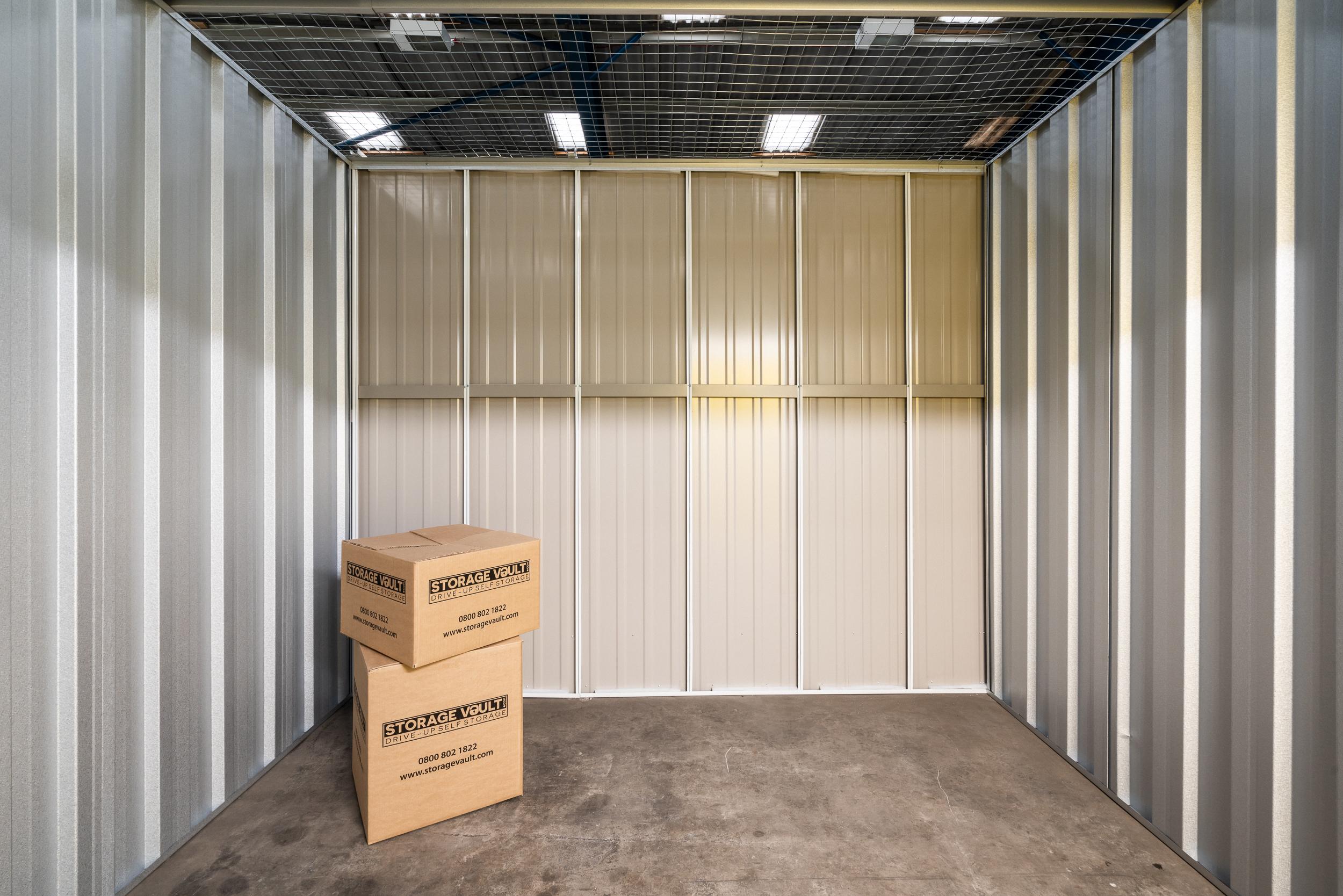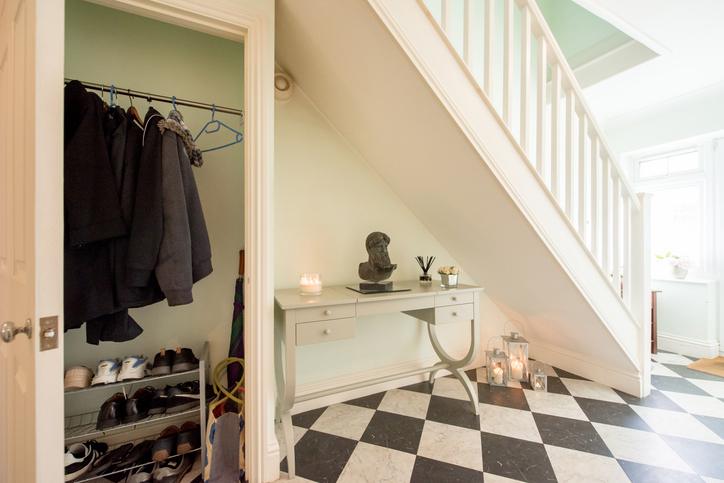Serviced Offices vs Managed Offices vs Coworking: Which Should You Choose?

Let me introduce you to three businesses looking for their perfect office space.
Pear is the leader in consumer tech and they’re just about to roll out their latest tablet device worldwide. They want to set up a new Glasgow office to oversee the marketing and distribution in the area.
Digi Force has been on the digital marketing scene for a decade. Their managing director has made a few new hires to tackle a big project they’ve just won. Very soon, they’ll outgrow their current office environment so they need a new office. Pronto.
Finally, Victoria and Neil have big dreams of storming the market with their content creation business. They’re currently working from their studio flat and they’re going stir crazy. They need a fresh, flexible office space to unleash their creative energy and a meeting space for client appointments would be nice too. But as a new business, they’re strapped for cash. Where can they go?
Your choice of working environment plays a massive role in your productivity. Picking the right space depends on your particular business needs. How much room do you need? How long do you need the space for? What facilities do you want? How much are you willing to fork out?
Are you thinking of setting up camp in a new office soon? To help you settle on the best option for you, we’re going to talk you through the pros and cons of three popular types of office: serviced office, managed office, and co-working space.
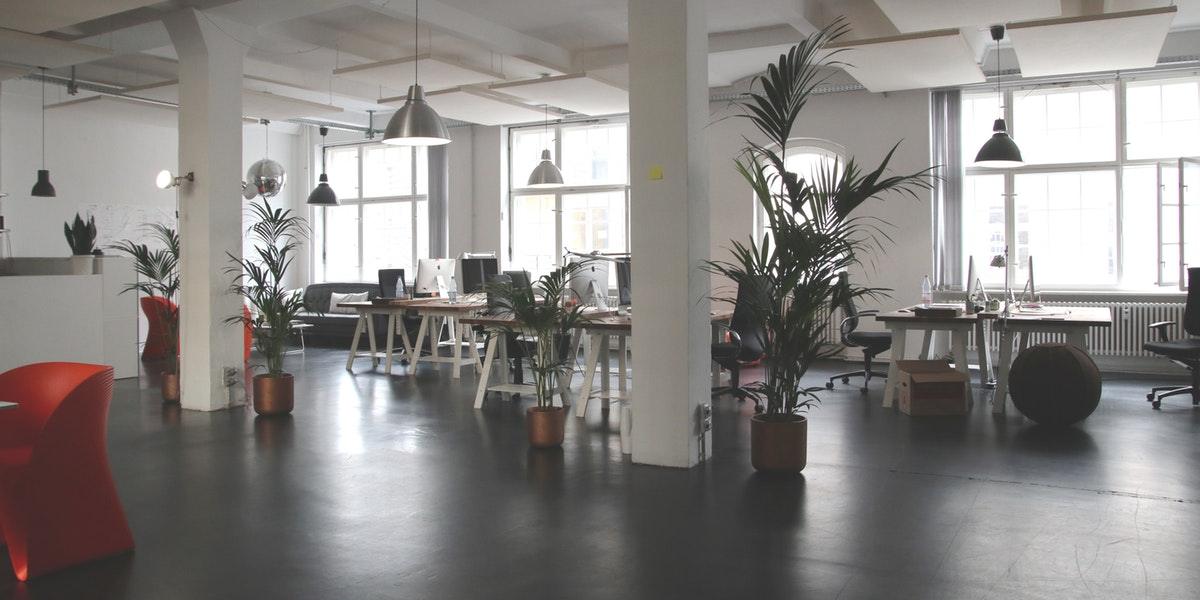
What is a serviced office?
Let’s take a tour of the average serviced office. As you enter the building, you pass through a reception area, which caters to all the businesses in the building. On the wall beside the front desk is a sign listing the floor that each business is on. You take the lift to a vacant office space, peering through the glass at the communal conference rooms and break spaces as you go up.
You’re surprised to see that the office is fully furnished. The Wi-Fi signal is strong and the phone lines are fully operational. A cleaner brushes past you with her trolley and a maintenance man has just fixed a faulty light bulb.
A serviced office is like a traditional office space but all the services and utilities are maintained by the office provider. The rent, utilities, furniture, access to conference rooms, cleaning, security, mail, and maintenance services are all tied up into one neat monthly payment. Businesses in serviced offices normally enter contracts of one or two years upfront.
What does this all mean for service office business users?
What are the benefits of a serviced office?
There are a whole host of benefits to operating in a serviced office which make business owners’ lives far easier.
Convenience
During your imaginary serviced office tour, we noted that everything was in place for a business to move in. Having furnishings and infrastructure pre-installed makes running a business from a serviced office very convenient.
Rather than running around like a headless chicken when the plumbing goes awry, you can just notify the office owners and they’ll fix it. Prior to move in, you won’t have any anxious check-ups on the status of your office furniture delivery either. And you won’t be tearing your hair out while you wait on hold to your Wi-Fi provider!
A serviced office is a very low-fuss conventional office space.
Flexibility
Contracts in a serviced office afford business owners flexibility. The contracts often have a fairly short notice period. Within a month or two, you can pack up your things and move on to pastures new.
Having a flexible contract like this relieves a lot of pressure on businesses who can’t foresee how their needs will change in the coming years. If you plan on expanding, you don’t need to stay crushed in a teeny office for the next couple of years, waiting for your lease to expire.
All-inclusive pricing
Tying the cost of all your utilities, rent, furniture, and services into one neat bundle simplifies things a lot.
Each month, your payment goes to your office provider and they take care of everything else. You won’t need to waste precious time sorting out your direct debits and tackling multiple invoices.
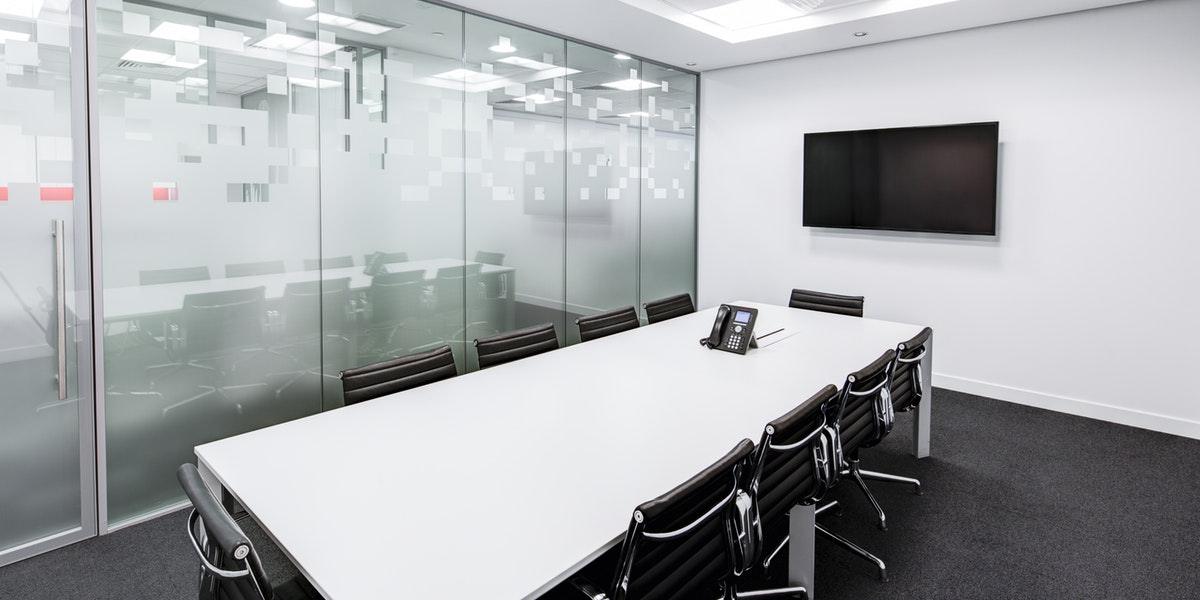
What are the drawbacks of a serviced office?
This all sounds good, right? Bear in mind that there are some drawbacks to a serviced office which may or may not apply to you!
Communal constraints
The reception, shared boardrooms, and breakout spaces are all controlled by the serviced office provider. This means you have no freedom to redesign the space to suit your needs or to align with your branding. You can make suggestions to the office owners but you’re not at liberty to put on your interior design hat and makeover the space on your own accord.
This might be an issue if you are keen to present a strong brand image to clients. You will usually have to meet with them in the generic communal meeting rooms which are devoid of any of your brand personality.
If you’re drawn by the convenience of a serviced office and you intend to set up shop there for the long haul, you might struggle to secure a long-term contract.
As we mentioned, serviced office contracts generally last no more than 12 or 24 months. After this point, you’ll have to re-negotiate with the owners. This can be a hassle if you know that you want to stick around for a fair amount of time.

Serviced offices are most suitable for…
Cast your mind back to our three businesses looking for a new office space. Out of these three, Digi Force is best-suited for a serviced office. It’s an established business that’s growing but they haven’t got a firm idea of where they will be in a few years. They don’t want to be tied into one office indefinitely.
Serviced office spaces don’t discriminate by business size or industry. They are, however, most popular amongst SMEs who need a professional, practical, and private working environment without high initial move-in costs or an extensive pre-move set up.
Serviced offices Glasgow
In Glasgow, you’re spoilt for choice when it comes to looking for a serviced office. Storage Vault have a number of serviced office spaces in their CoVault workspace! Read about some of our current CoVaulter’s experiences here:
What is a managed office?
Now for a tour of an unoccupied managed office. At first glance, it’s pretty bare bones. It’s a traditional office space that gives businesses a completely blank canvas to work with. There are no furnishings, utilities, or services in place. Whoever moves in will have to set up everything themselves from scratch.
A managed office is vastly different from a serviced office, handing a lot more responsibility and control onto the business leasing there. Businesses enter a fixed contract with landlords, generally stipulating they will be there for a minimum of three years.
Without all the perks and convenience of a serviced office, why are businesses keen to sign up for a managed office?
What are the benefits of a managed office?
A managed office fits the bill for some businesses for a number of reasons.
Creative control
The clear landscape in a managed office gives businesses full creative control over the aesthetic of the office environment, tailoring it exactly to their business needs and preferences.
From the branding on the wall and the signage on the doors to the choice of lighting fixtures and desks, you can pick and choose everything so that it aligns with your brand. That lets you craft an image to present to employees and visiting customers. There’s no need to report to any higher authority for permission. You have free reign.
Long-term planning
Managed offices give businesses a sense of security that they’ll have a functional place to work for years down the line. This helps you make long-term business plans.
With a dependable home base, you can also invest in more adventurous interior design projects that you can make the most of for years to come, rather than flushing money down the drain just to have to move again in the near future.
Privacy
There is complete privacy with a managed office. The space is entirely the domain of the business leasing there so there are no interruptions from other businesses anxious to use the meeting room.
This privacy is perfect for carrying out private business strategy meetings or non-disclosure client work. It relieves a lot of anxiety on employees to keep hush hush when others are around!
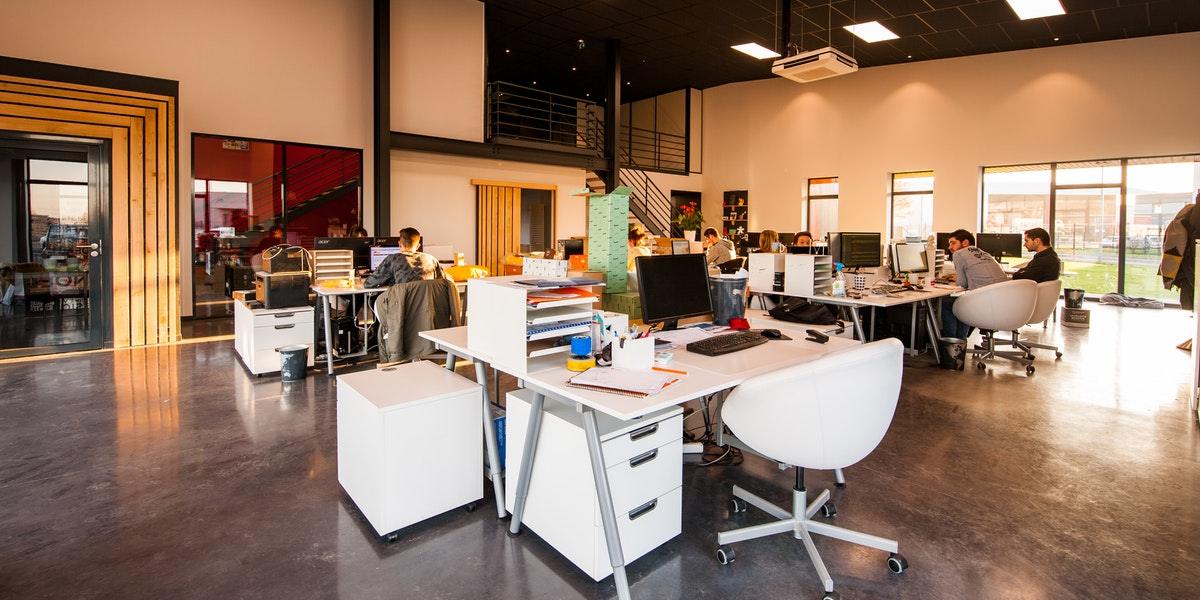
What are the drawbacks of a managed office?
As with most things, there are some drawbacks. Here are the key downsides of a managed office.
Upfront costs
When you move into a managed office, you need to have a lot of capital behind you to fund the hefty upfront costs of setting up.
Purchasing all of the furnishings, installing all the infrastructure, and splashing paint on the walls all racks up significantly!
Delayed move-in
Since you need to fully prepare the premises yourself, the transition into the managed office can be slow and time-consuming.
With other office types, you can sign on the dotted line and move in as soon as you like. There is an endless list of things to organise and the process of sorting out all the logistics of the move can be very stressful, hampering productivity!
Tied down
We talked about the long-term contracts being a benefit, but for some businesses, it’s actually a drawback.
Lengthy contracts can be unattractive, especially if you’re unsure how fast your business will grow in the coming years. If you’re worried about the financial hardship these contracts might impose on your business, it may not be the best option for you.

Managed offices are most suitable for…
Pear should look for a managed office. They are a highly-experienced international business and they know exactly where they will be in a few years. They value complete creative control and have a large dedicated budget to devote to the set-up.
Managed offices are best for businesses who have long-term growth plans, the funds to make the move, and who want their premises to ooze their brand.
Managed offices Glasgow
If you’re looking for a managed office in Glasgow, check out these sites:

What is a co-working space?
And now for our final tour: the co-working space. Once you’re through the doors of the co-working space, you’ll see an eclectic mix of people. Some people sit in the private booths that line the wall. Some are sitting at ordinary working desks furiously typing away on their laptops. Others are lazed on the couches at the back of the room, scribbling on notepads. A meeting is taking place in a private booth in the corner.
Free-flowing plants are dotted around the room and a funky neon sign blurs on the wall. You can smell freshly ground coffee beans emanating from the coffee shop through in the next room. This is unlike any work space you’ve ever seen.
Co-working spaces are an increasingly popular addition to the working environment sphere. Individuals or small teams pay a fee to work in the space, signing up for incredibly flexible contracts. The space is used by multiple businesses who can do their own thing under one roof.
A co-working space is clearly vastly different from a space in a serviced office or managed office. Let’s learn more.
What are the benefits of a coworking space?
Many businesses rave about the benefits that a co-working space offers them. What do they say?
Cheap and cheerful
A co-working space has similar facilities to a serviced office, but because you don’t have your own private office, you pay a fraction of the cost.
You’ll never need to pay out of your own pocket for furniture or repairs in the building. The space is kitted out with all the basic amenities you’d need in an office space, including high speed WiFi, comfortable desks and chairs, and all your basic utilities.
It’s a very cost-effective way of working away from home, giving you a practical space to work in, rather than paying for coffee after coffee just to use the shoddy Internet in your local cafe.
Come and go
A co-working space is the most flexible workspace of the three we’ve looked at.
You’ll never be tied up into a long-term contract. In fact, some co-working sites offer hourly or daily rates, allowing you to come and go as you please.
Social
Cabin fever is rife for many people working at home. The lack of socialisation can hamper some people’s productivity and networking can be difficult.
Opting for a co-working spot will allow you to be more sociable. Whether you connect with the person working beside you or you simply have a chat with someone in the breakout area, it’s a perfect way to keep social and productive – and you might even make a useful business connection or two!

What are the drawbacks of a co-working space?
The buzz of a co-working space isn’t for everyone. What puts people off?
No privacy
Working in a shared office space means you’re generally working out in the open, surrounded by other people. That means you can’t talk about your super top secret business plans or meet with clients who request non-disclosure agreements for their projects.
Some sites do have private meeting rooms you can access, but you won’t have the freedom to access these like you would in your own private office.
No creative input
The design of most modern co-working sites is generally well thought out, making them functional and aesthetically-pleasing. Like in the communal areas in a serviced office space, however, you have no control over the interior design. You’re limited in how much you can customise your work area to reflect your brand.
Resource competition
Co-working spaces are centred around the communal space so resources like private meeting rooms or breakout spaces are hard to claim for your own.
It might be hard to secure a meeting space for a client visit on short notice so you’ll have to be organised!

Co-working spaces are most suitable for…
Naturally, a co-working space is best suited for small businesses like the one Victoria and Neil are trying to get up off of the ground.
Due to their highly flexible nature and their low cost, they are best for freelancers or small startups on a tight budget. Victoria and Neil need somewhere they can focus, that won’t cost them an arm and a leg, and the prospect of making industry connections with fellow co-workers is a big bonus!
If you work well in a social atmosphere and you don’t mind not having a permanent private space, then a co-working space is perfect for you.
Co-working space Glasgow
All across Glasgow, co-working spaces are popping up. Look out for:
- The Distillery at The Whisky Bond, based along the Glasgow canal.
- Glasgow Collective, located in the Barrowlands.
- Toad’s Caravan, located on Pollokshaws Road in the Southside.

Serviced, managed, or co-working?
If you’re thinking seriously about taking the plunge and finding yourself a brand spanking new office space, this will give you some food for thought.
By considering your needs in terms of office size, contract flexibility, budget, privacy needs, and creative control, it’ll be clear which of these three office types are best for your business.
When you make the move, you might find your need a home for your business possessions, be it temporarily during the move or permanently once you’ve settled. Whether it be important documents, trade show stock, or spare desks and chairs, there’s a place for them at Storage Vault.
We’d be happy to talk you through your options with you, all you need to do is get in touch!
Get in touch


